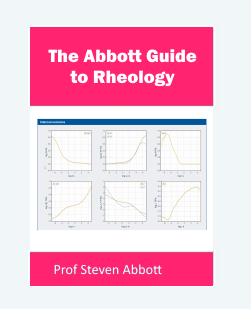The Abbott Guide to Rheology
A free eBook linked to the apps in Practical Rheology

Rheology is too often seen as scary, unhelpful, confusing, difficult and obscure. That is because it is discussed by smart rheologists who don't understand how difficult they make it for the rest of us. The point of The Abbott Guide to Rheology (61pp & 21k words) is to make rheology usable by the formulation community. It is short, informal, completely free and is not tied to any advertising or email list and doesn't require registration.
In very short chapters, all linked to apps in these Practical Rheology pages, it covers:
- Setting the Scene: The necessary basics of rotational viscosity
- Shear thinning and thixotropy, models and explanations
- Yield Stress: Demystifying what it is and showing how to measure it.
- Semi-Solids: All the G':G'' stuff along with time-temperature equivalence to extend your measurement range.
- Entanglement and Relaxation: Two powerful ideas that deserve to be better understood and used.
- Interconversions: Seeing the broad range of measurements as different (and complementary) ways of looking at the same data.
- Particle Rheology: Simple but powerful models for looking at yield stress, high shear effects and the packing fraction.
 The book is Copyright © 2018 Prof Steven Abbott and is distributed under the Creative Commons BY-ND, Attribution and No-Derivatives license.
The book is Copyright © 2018 Prof Steven Abbott and is distributed under the Creative Commons BY-ND, Attribution and No-Derivatives license.
Downloading
Just click to read and download the PDF version (I've not created iPad or Kindle versions): The Abbott Guide to Rheology.pdf. If you want to download it directly, use right click. There is no "registration" or asking for details. It's just there ready to read.
Updatable
Version Information
- 1.0.0 8 December 2018.
- Initial release
- 1.0.1 9 December 2018.
- Tweaks and improvements
- 1.0.2 16 October 2019.
- Mc from Likhtman-McLeish theory
One of the joys of producing my own book and giving it away is that I can rapidly respond to the reader community. I can quickly fix typos, reword passages that are unclear, improve the layout within a given reader. More importantly, if there is science that is incomplete, wrong or missing I am happy to do my best to fix the problem. I can't do this without your help, so please email me at steven@stevenabbott.co.uk if you want me to make improvements.
Where does the science come from?
My task has been to find the good, useful scientific principles and distill them into words and apps that allow people like me to use the principles in practice. In addition to reading books and many academic papers, I've had the chance to meet and learn from some wonderful rheologists and many that I haven't met have most generously helped me via email. In the book I acknowledge those who have helped me directly, and in any app the source of the science is clearly noted. All the credit for the science goes to the experts. All the blame for errors in describing and implementing their science goes to me.
Happy reading!
Steven

